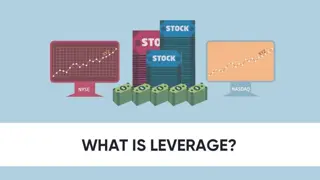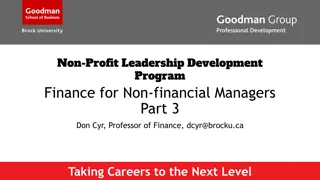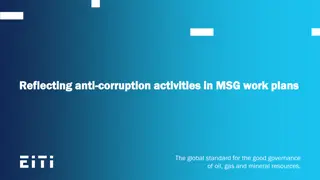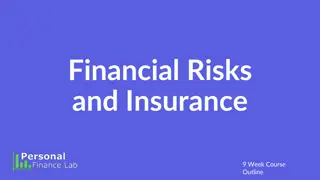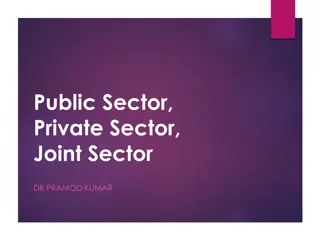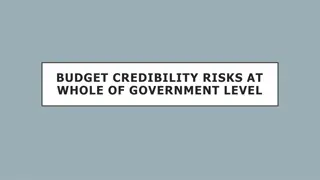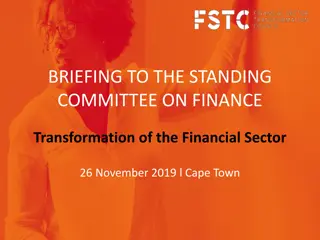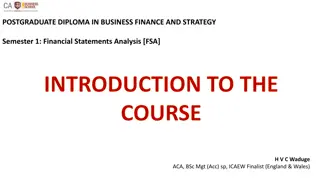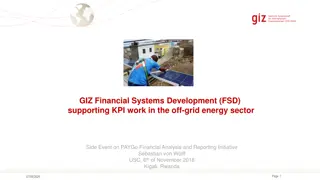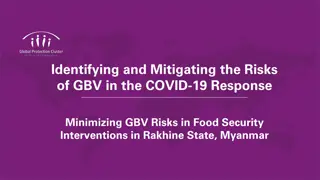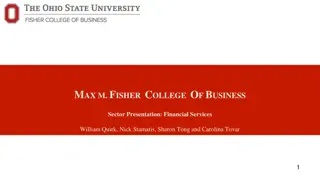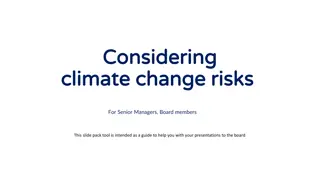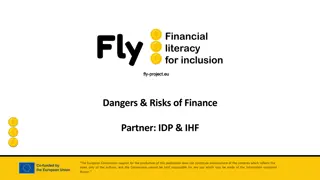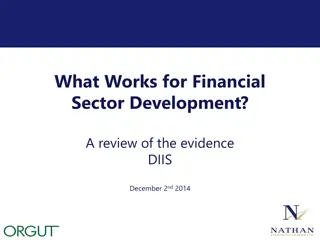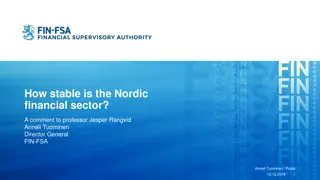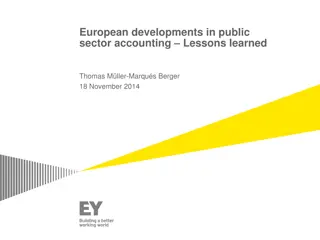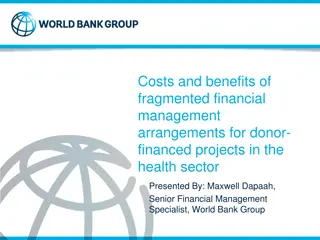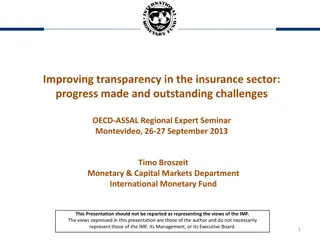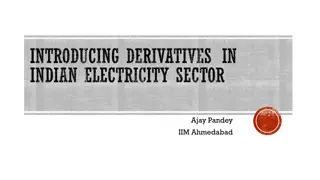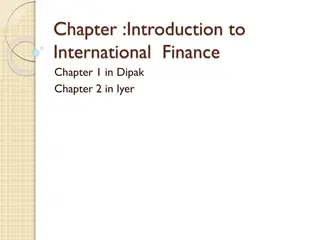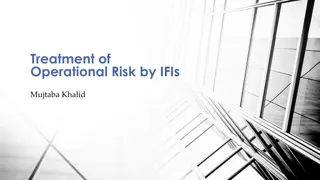Managing Power Platform Risk with an Environment Strategy by Frank Shink, Senior Power Platform Design Engineer at Ameriprise Financial
Frank Shink, a seasoned professional, delves into the risks associated with Power Platform, from development risks to cost risks, and offers insights on tools and strategies to combat these risks effectively. He emphasizes the importance of environments, DLP policies, and licensing strategies in mit
1 views • 20 slides
Hungarian Banking System Stability Report May 2023
The Financial Stability Report for May 2023 of the Hungarian banking system highlights the resilience of banks despite international failures. The report discusses indicators of financial stability, risks faced by banks, and the sector's robust capital position. There are insights on private sector
5 views • 32 slides
Circular Flow in a Four-Sector Economy Explained
The circular flow in a four-sector economy involves households, firms, government, and the foreign sector. Each sector plays a crucial role in money flows and payments, contributing to the continuous flow of income. The financial market also has a significant impact on the economy by accumulating sa
3 views • 8 slides
Understanding Economic Activities and Their Classification
Economic activities encompass the production, distribution, and consumption of goods and services within a society. Economists classify economic activities into four main sectors: Primary, Secondary, Tertiary, and Quaternary, each with distinct roles and functions. The Primary Sector involves raw ma
7 views • 12 slides
Understanding Financial Leverage and Its Implications
Financial leverage refers to a firm's ability to use fixed financial costs to amplify the impact of changes in earnings before interest and tax on its earnings per share. It involves concepts like EBIT, EBT, preference dividends, and tax rates, and can be measured through the degree of financial lev
1 views • 7 slides
Non-Profit Leadership Development: Finance Essentials for Managers
Explore the key concepts of finance for non-financial managers in the non-profit sector. Learn about cost benefit analysis, measures of project worthiness, and essential financial tools such as NPV, IRR, and ROI. Understand how to assess project risks and make informed financial decisions to enhance
1 views • 47 slides
Understanding Financial Economics and Its Importance in Markets
Financial economics is a branch of economics focused on the distribution of resources in uncertain markets. It involves making decisions considering future events and creating models to analyze variables affecting decisions. Key aspects include working out portfolio risks and utilizing financial ins
0 views • 129 slides
Enhancing Anti-Corruption Activities in Extractive Sector Work Plans
Reflecting on anti-corruption activities in MSG work plans is crucial for good governance of oil, gas, and mineral resources. The EITI provides guidance on addressing corruption risks, with a recommended three-step approach: assess risks, develop an activity plan, and monitor results. Step 1 involve
0 views • 11 slides
Understanding Financial Risks and Insurance: Course Overview
Learn about financial decision-making, protecting against fraud, and mitigating financial risks in this 9-week course. Explore the basics of insurance, including key terminology such as contracts, risk aversion, and premiums. Understand the importance of insurance in managing financial risks and inv
0 views • 61 slides
Understanding Public and Private Sectors in the Economy
The public sector, private sector, and joint sector play crucial roles in the economy. Public sector includes government services and enterprises, while private sector focuses on profit-making activities. Private sector contributes significantly to national income, generates employment, and ensures
0 views • 20 slides
Managing Budget Credibility Risks at Whole of Government Level
Understanding and addressing budget credibility risks at the whole of government level is crucial for effective financial management. Common indicators of risks include unrealistic revenue projections and financial indiscipline. Linkages between government-wide credibility and program-level performa
0 views • 7 slides
Albanian National Financial Education Strategy 2022-2027
The Albanian National Financial Education Strategy (NFES) aims to promote financial education for individuals, households, and MSMEs to enhance financial well-being and economic stability. It focuses on key interventions, foundational enablers, institutional coordination, funding, and monitoring. Fi
0 views • 19 slides
Transformation of the Financial Sector: Briefing to the Standing Committee on Finance
The briefing presented on 26 November 2019 in Cape Town highlighted the transformation of the financial sector, focusing on the implementation of recommendations, updates to the Financial Sector Code, and the way forward. It included the rebranding to the Financial Sector Transformation Council, the
0 views • 17 slides
Understanding Financial Statements Analysis in Business Finance
Understanding the analysis of financial statements is crucial for assessing the financial performance and position of an organization. This course provides knowledge, competencies, and skills necessary to apply basic financial statement analysis techniques, interpret financial numbers, and generate
0 views • 18 slides
Private Sector Engagement in Climate Solutions for Agriculture Sector
Explore opportunities for private sector engagement in delivering climate solutions in the agriculture sector to meet NDC/NAP ambitions, including panel discussions with various actors and investors, highlighting emerging investment opportunities and barriers hindering funding towards climate-relate
2 views • 4 slides
Financial Systems Development (FSD) Supporting KPI Work in Off-Grid Energy Sector
Explore the initiatives of GIZ in promoting complex reform and change processes in the off-grid energy sector, including financial analysis and reporting. The Financial Sector Development (FSD) projects in various countries showcase efforts to support stability, green finance, microfinance, SME fina
2 views • 8 slides
Identifying and Mitigating GBV Risks in COVID-19 Response for Food Security in Rakhine State, Myanmar
Rakhine State faces challenges of conflict, displacement, and restricted movement, with many relying on food assistance. Cash assistance implementation did not escalate GBV risks. The COVID-19 restrictions heightened the need for adjustments in programming, requiring monitoring of assistance changes
0 views • 5 slides
Understanding Artificial Intelligence Risks in Short and Long Term
This content delves into the risks associated with artificial intelligence, categorizing them into short-term accident risks and long-term accident risks. Short-term risks include issues like robustness problems and interruptibility, while long-term risks focus on competence and alignment challenges
0 views • 15 slides
Financial Services Sector Overview: Max M. Fisher College of Business Presentation
Sector presentation on Financial Services by William Quirk, Nick Stamatis, Sharon Tong, and Carolina Tovar from Max M. Fisher College of Business. The presentation covers the market size, performance, industries, top companies, and business analysis of the sector. It highlights the sector's performa
0 views • 36 slides
Analyzing Systemic Climate Risk in the Financial Sector
This study discusses systemic climate risk in the financial sector by examining the effects of climate risks on financial institutions. It aims to design a market-based framework to assess the vulnerability of financial institutions to climate risks and analyze potential contagion effects. The frame
0 views • 39 slides
Managing Financial Risks in a Changing Climate Environment
Assessing climate-related and environmental risks is vital for ensuring the safety and soundness of financial institutions. These risks include physical risk drivers like extreme weather events and transition risk drivers related to policy measures and technological changes. The complexity and uncer
0 views • 11 slides
Addressing Climate Change Risks: Guidance for Senior Managers and Board Members
This slide pack tool provides guidance on addressing climate change risks for senior managers and board members. It covers key messages such as understanding obligations and gaps, identifying climate change risks, exploring responsibilities, and implementing actions to address these risks effectivel
0 views • 11 slides
Understanding Financial Risks and Mitigation Strategies
Explore the concept of financial risks, learn how to identify and mitigate them, and improve your financial decision-making skills. This module covers definitions, typical risks, and strategies to safeguard your finances. Discover the four main clusters of financial risks and how to implement counte
0 views • 17 slides
Financial Sector Development: Evidence and Strategies
Reviewing the evidence on financial sector development reveals that stable institutions, effective policies, and proper support functions are crucial for financial deepening, inclusion, and long-term finance. Strong evidence suggests that macro stability, liberal policies, and efficient regulations
0 views • 13 slides
Overview of Nordic Financial Sector Stability
The stability of the Nordic financial sector has been examined in relation to past crises and indicators like rapid credit growth and house prices. While the current situation seems stable, risks remain, especially with low interest rates impacting households and banks. Lessons from the 2008 crisis
0 views • 8 slides
Enterprise Risk Management (ERM) Strategies for Mitigating Key Business Risks
Enterprise Risk Management (ERM) is a crucial strategic discipline that involves prospectively identifying, managing, and mitigating risks to reduce uncertainties and ensure organizational objectives are met. Risk rankings, mitigation strategies, and lead roles are outlined in the SJIEMS 2017 ERM Re
0 views • 38 slides
Understanding the Risks of Cheap Natural Gas and Hydraulic Fracking
This introduction delves into the multifaceted risks associated with the exploitation of cheap natural gas and hydraulic fracking. Covering climate risks, economic consequences of petro-states, direct GHG risks, and local environmental risks, the content underscores the complex challenges and implic
0 views • 8 slides
Financial Literacy Empowerment in Eastern and Southern Africa
Developing countries in Eastern and Southern Africa are prioritizing financial education to empower consumers in making sound financial decisions. Financial literacy enhances financial inclusion, stability, and economic growth. It involves awareness, knowledge, skills, attitudes, and behaviors essen
0 views • 23 slides
European Developments in Public Sector Accounting: Lessons Learned
This presentation delves into the sovereign debt crisis in Europe, highlighting its causes and lessons learned. It discusses the role of the public sector in relation to the private sector's performance, the impact of political systems on public sector accounting reforms, and the need for a harmoniz
0 views • 18 slides
Financial Literacy and Education Commission: Coordinating Federal Efforts
Financial capability empowers individuals to manage financial resources effectively, make informed choices, avoid pitfalls, and improve their financial well-being. The Financial Literacy and Education Commission (FLEC) works to improve the financial literacy of individuals in the United States throu
0 views • 16 slides
Challenges and Opportunities in Health & Social Care Sector
The Health & Social Care sector is facing key skills challenges such as doing more with less, attracting talented individuals, and addressing skills shortages. The sector plays a crucial role in providing services like residential care, hospital activities, social work, and more. With an aging popul
0 views • 24 slides
Costs and Benefits of Fragmented Financial Management in Health Sector Projects
The study explores the costs and benefits of fragmented financial management arrangements for donor-financed projects in the health sector. It emphasizes the importance of open and orderly Public Financial Management (PFM) systems in achieving desirable outcomes and discusses strategies to minimize
0 views • 15 slides
Progress and Challenges in Enhancing Transparency in Insurance Sector
The presentation discusses the progress made and challenges faced in improving transparency in the insurance sector, highlighting the importance of the G20 Data Gaps Initiative. It covers the conceptual and statistical framework, data collection needs, and areas for enhancement to address risks in t
0 views • 16 slides
Potential of Derivatives in Indian Electricity Sector
The Indian electricity sector, post the enactment of EA 2003 and unbundling, has relied heavily on long-term power purchase agreements and bilateral contracts. However, limitations exist, such as lock-ins and default risks. Introducing derivatives could mitigate these risks, provided the necessary c
0 views • 7 slides
Health Sector Review and SWAp Evaluation in Mozambique
Joint Annual Health Sector Review and Sector-Wide Approach evaluation in Mozambique focus on assessing the performance of the health sector, enhancing communication between Ministry of Health and partners, and ensuring consistency and credibility of health sector information over the years. The proc
0 views • 9 slides
Stock Recommendation for Autumn 2021 - Sector Overview and Analysis
Materials Sector overview and analysis for Autumn 2021, including SIM Holdings & Allocation, Sector Performance, Business Cycle analysis, External Factors affecting the sector such as COVID-19 impact and supply chain issues, and Supply and Demand dynamics. The report discusses the current state of t
0 views • 34 slides
Exploring Job Opportunities in Different Sectors and Industries
Discover various job application strategies based on sector (Private, Public, Non-Profit), industry (Education, Healthcare, Construction, Business, etc.), and level (Entry-level, Specialized, Leadership). Learn where to find specific job postings, whether on job aggregators, sector-specific boards,
0 views • 11 slides
Understanding International Finance: Scope, Importance, and Challenges
International finance explores interactions between countries, including currency exchange rates, foreign direct investment, and risk management. The scope includes foreign exchange markets, MNC financial systems, and international accounting. It raises questions on liberalizing financial markets, I
0 views • 52 slides
Understanding Risk Management in Islamic Finance Institutions
Islamic Financial Institutions (IFIs) face various types of risks, including Shariah compliance, rate of return, displaced commercial equity investment, and operational risks. This content delves into how IFIs manage these risks through Shariah auditing, risk management for financial contracts, and
0 views • 35 slides
Advancing Inclusive Energy Sector Through Sector Reforms
The role of the electricity transmission utility in building an inclusive energy sector for a sustainable future is crucial. Sector reforms have led to the restructuring of the electricity supply industry in Ghana, promoting efficient supply of competitively priced electricity driven by private sect
0 views • 10 slides




